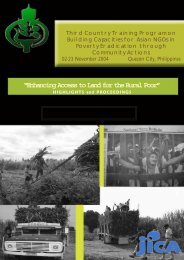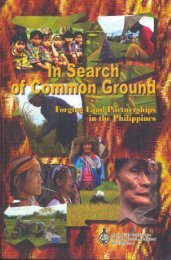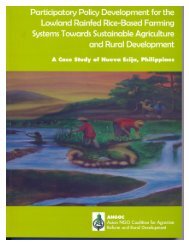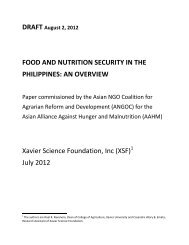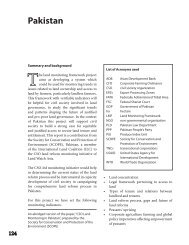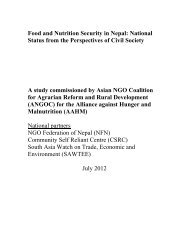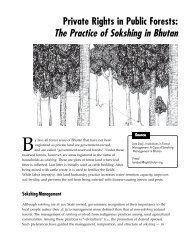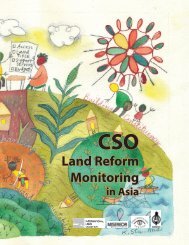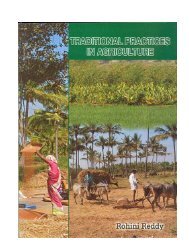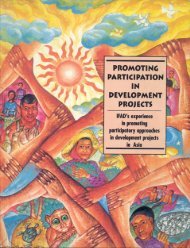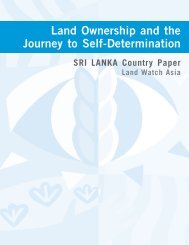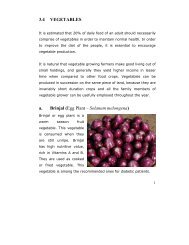Securing the Right to Land FULL - ANGOC
Securing the Right to Land FULL - ANGOC
Securing the Right to Land FULL - ANGOC
Create successful ePaper yourself
Turn your PDF publications into a flip-book with our unique Google optimized e-Paper software.
SECURING THE RIGHT TO LAND<br />
70<br />
National and Local Government<br />
The following line ministries and government offices have a<br />
direct influence on land issues:<br />
Ministry of <strong>Land</strong> Management, Urban Planning and<br />
Construction<br />
Responsible for land management, including <strong>the</strong> development<br />
of <strong>the</strong> policy and regula<strong>to</strong>ry framework, and coordination of<br />
land use planning and land registration and administration;<br />
Ministry of Agriculture, Forestry, and Fisheries<br />
Responsible for organizing and operating development policies<br />
in <strong>the</strong> agriculture sec<strong>to</strong>r, including moni<strong>to</strong>ring and<br />
management of natural resources, promoting <strong>the</strong> development<br />
of technical skills and knowledge, and improving <strong>the</strong><br />
work of concerned professional organizations, NGOs, and<br />
o<strong>the</strong>r associations involved in <strong>the</strong> agriculture sec<strong>to</strong>r;<br />
CASE STUDY #5<br />
Private Interests vs. Local Needs<br />
In January 2000, Pheapimex, <strong>the</strong> local partner<br />
of <strong>the</strong> Chinese company, Wuzhishan<br />
LS Group, was granted two successive 70year<br />
Economic <strong>Land</strong> Concessions (ELCs) on<br />
over 300,000 hectares of land in order <strong>to</strong> grow<br />
eucalyptus trees and <strong>to</strong> operate a paper mill.<br />
The concession area is located in Pursat and<br />
Kampong Chang provinces in west-central<br />
Cambodia.<br />
Local villagers only become aware of <strong>the</strong><br />
concession when Pheapimex began its preliminary<br />
operations. As a result of an advocacy<br />
campaign led by <strong>the</strong> affected<br />
communities, who sent petitions <strong>to</strong> local authorities,<br />
national and international organizations<br />
and institutions, <strong>the</strong> company’s<br />
activities were suspended in late 2000 and<br />
villagers were allowed <strong>to</strong> remain on <strong>the</strong> land.<br />
During a follow-up visit <strong>to</strong> <strong>the</strong> site by <strong>the</strong> Office<br />
of <strong>the</strong> High Commissioner on Human <strong>Right</strong>s<br />
(OHCHR)/Cambodia in May and July 2003,<br />
it was found that <strong>the</strong> company was still not<br />
operating in ei<strong>the</strong>r province.<br />
In November 2004, <strong>the</strong> company restarted<br />
its activities after securing a permit from <strong>the</strong><br />
Ministry of Agriculture, Forestry and Fisher-<br />
ies. Once again, <strong>the</strong> affected residents were<br />
not informed by <strong>the</strong> company or by <strong>the</strong> local<br />
government of <strong>the</strong> resumption of Pheapimex’s<br />
operations.<br />
Protest marches, including a blockade of<br />
National Highway 5, were undertaken by <strong>the</strong><br />
communities. The conflict came <strong>to</strong> a head when<br />
a grenade was thrown at a group of 600 protesters<br />
who had taken refuge in <strong>the</strong> compound<br />
of <strong>the</strong> local mosque. Yet, in spite of continued<br />
police harassment, <strong>the</strong> protesters kept<br />
up <strong>the</strong>ir campaign.<br />
Meetings were set with government officials<br />
and company representatives, but<br />
nei<strong>the</strong>r showed up. At <strong>the</strong> beginning of 2005,<br />
<strong>the</strong> incidence of violence was reduced. An<br />
opposition political party declared <strong>the</strong>ir support<br />
for <strong>the</strong> villagers. The community members<br />
also appealed directly <strong>to</strong> <strong>the</strong> King for his<br />
intervention. The King forwarded <strong>the</strong> complaint<br />
<strong>to</strong> <strong>the</strong> Prime Minister, but <strong>the</strong> latter <strong>to</strong>ok<br />
<strong>the</strong> side of Pheapimex, saying that its operations<br />
would be beneficial <strong>to</strong> <strong>the</strong> area and <strong>to</strong><br />
its residents, and chided <strong>the</strong> protesters for<br />
allowing <strong>the</strong>mselves <strong>to</strong> be used for propaganda<br />
purposes by <strong>the</strong> opposition party.<br />
Ministry of Rural Development<br />
Responsible for integrating all rural development work at<br />
household, village, and commune levels, focusing on poverty<br />
alleviation through rural infrastructure improvement.<br />
Prime Minister Hun Sen has declared that <strong>the</strong> Cambodian Government<br />
has made significant progress <strong>to</strong>ward developing legal<br />
frameworks required for land reform. 5 However, <strong>the</strong> Government<br />
has also acknowledged that <strong>the</strong> majority of rural farmers have yet<br />
<strong>to</strong> benefit from <strong>the</strong> country’s economic growth (8.4% per year<br />
from 1994 <strong>to</strong> 2006), and that building tenurial security is <strong>the</strong><br />
first step <strong>to</strong>ward improving <strong>the</strong> economic conditions of <strong>the</strong> poor.<br />
Hun Sen has also announced <strong>the</strong> tightening of criteria for<br />
granting ELCs and cited <strong>the</strong> need <strong>to</strong> allocate land <strong>to</strong> <strong>the</strong> landless<br />
In March 2005, <strong>the</strong> village resumed its<br />
protest, but this time adopted <strong>the</strong> strategy of<br />
active non-violence. Following this,<br />
Pheapimex’s operations suddenly s<strong>to</strong>pped.<br />
A resolution calling for <strong>the</strong> establishment<br />
of a Community Forestry group among <strong>the</strong><br />
affected communities has been submitted <strong>to</strong><br />
<strong>the</strong> Provincial Office in Pursat. The resolution<br />
was formulated with <strong>the</strong> help of STAR<br />
Kampuchea and <strong>the</strong> Civil Society Advocacy<br />
Coordination Alliance (CACA), and <strong>the</strong> Commune<br />
Council.<br />
This case highlights four important aspects.<br />
Firstly, companies make decisions without<br />
consulting <strong>the</strong> affected communities, and<br />
often despite opposition from <strong>the</strong> latter. Secondly,<br />
companies make only <strong>to</strong>ken efforts <strong>to</strong><br />
resolve a conflict 6 (including public dissemination<br />
of relevant information). Thirdly, government<br />
officials, at all levels, tend <strong>to</strong> ignore<br />
even <strong>the</strong> most obvious violations committed<br />
by private companies 7 . Fourthly, affected<br />
people and villagers need <strong>the</strong> help of NGOs<br />
<strong>to</strong> develop <strong>the</strong>ir advocacy skills, <strong>to</strong> utilize nonviolent<br />
resolution mechanisms, and <strong>to</strong> be made<br />
aware of <strong>the</strong>ir rights.



